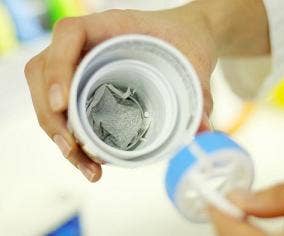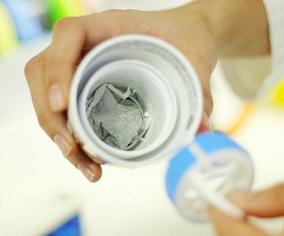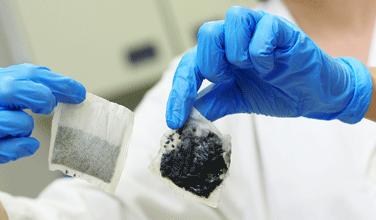South African Nanotech ‘Tea Bag’ To Filter Water for Pennies

Share
Provide people cheap access to clean water and you could save billions of lives. South Africa may use tea bags to do just that. Researchers at Stellenbosch University's Water Institute have developed a new water filtration system that uses activated carbon and nanofibers to quickly filter out pathogens. The carbon and nanofibers are placed in common tea bags and then fitted into a bottle. Fill the bottle with dubious water, install a filter, and drink. It's that easy. According to SciDev Net, the ultimate price for these 'tea bag' nanfiber filters will be around half a cent (USD) each and be able to handle around 1 L before being replaced. A super cheap, portable, easy to use system to purify water? Sounds amazing. Watch developer (and SU dean) Eugene Cloete describe the project in the video below. You know a scientist believes in a product when he's willing to test it on himself in front of a camera.
The nanofiber filter system is part of the Hope Project in South Africa, which hopes to improve the lives of millions of Africans by addressing major problems like poverty and health. Sounds a little like our own Singularity University. Providing potable water is an arduous task, as each region has its own variety of difficulties, be they availability, pollution, disease, or salinity. The on-the-spot purification system that Stellenbosch University has developed won't solve all of these problems, but it does allow people to bring the means of filtering water everywhere.
The 'tea bag' filtering system works thanks to the nanofibers contained within. According to Engineering News, those fibers are bonded to thin films of biocides. As water passes through the bag, activated carbon removes various chemical compound and impurities while the biocides on the nanofibers quickly destroy microbes. Simply by passing through the filter diseased water can be made safe to drink.
Be Part of the Future
Sign up to receive top stories about groundbreaking technologies and visionary thinkers from SingularityHub.


South Africa's Bureau of Standards is currently reviewing the nanofiber filter and accessing its viability. Once approved, the products could theoretically go into mass production. It's unclear, however, how quickly the Hope Project could scale up manufacture of the filters. It's final price will undoubtedly be low, but the actual half cent per bag estimate could change.
I should mention that there are many other water purification systems out there, each with their own promises and limitations. Current military grade water cleansing tablets cost around 30 cents (USD) and handle around 1 liter of water. Charitable projects, like the Life Straw, are seeking to get hundreds of liters through a device that costs a few dollars, and that might be able to handle water with high salt content. We'll likely want a plethora of these water purification technologies, including Stellenbosch's tea bag nanofiber filters, to succeed so that people in water scarce areas have a variety of cheap options to chose from. I applaud Eugene Cloete, Stellenbosch University, and the Hope Project for striving to provide people around the world with clean water, and I hope solutions like these get to market as soon as possible. We have a lot of thirsty people out there.
[image credits: Hope Project/Stellenbosch University Water Institute]
[video credit: Stellenbosch University]
[source: Hope Project, Engineering News (South Africa), SciDev Net]
Related Articles

Researchers Break Open AI’s Black Box—and Use What They Find Inside to Control It

This Week’s Awesome Tech Stories From Around the Web (Through February 21)

What the Rise of AI Scientists May Mean for Human Research
What we’re reading

